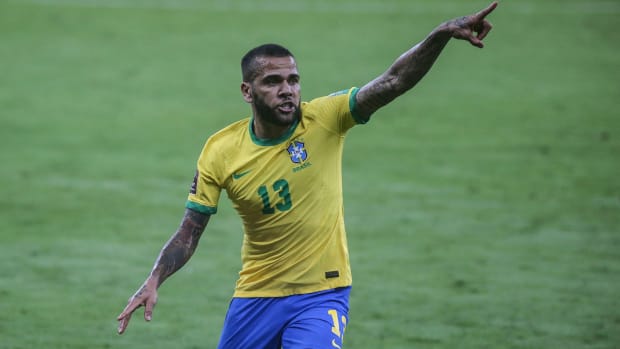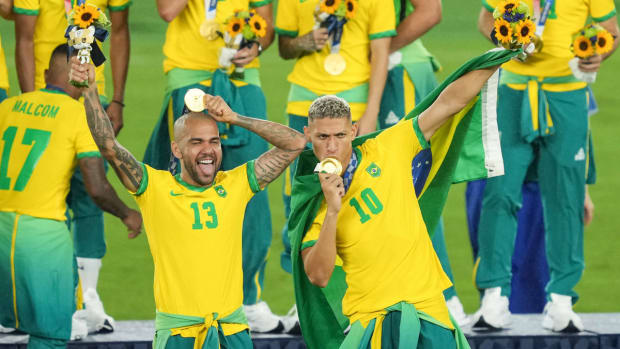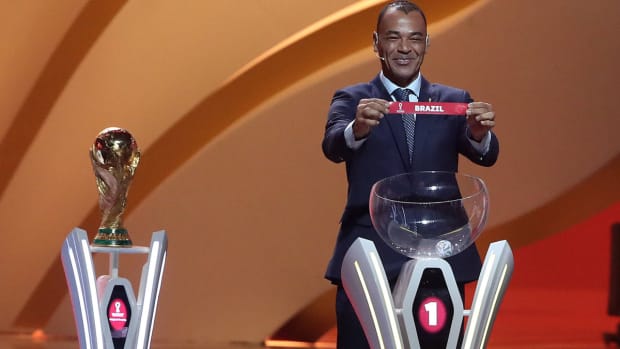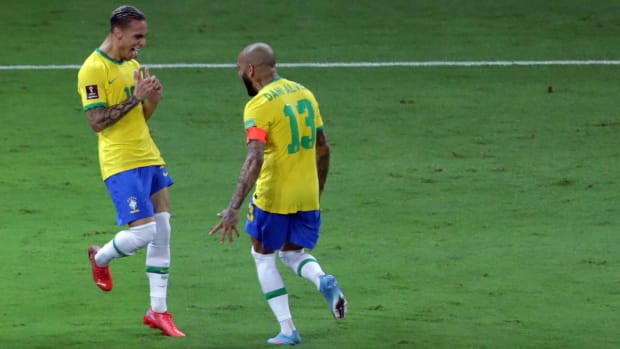View the original article to see embedded media.
Dani Alves just wants to make more history.
No player has won more titles for club and country than his 42—not Lionel Messi, not Cristiano Ronaldo, not Pelé. Yet there is one very obvious piece of hardware missing, and it just happens to be the one that is often used to measure the success of Brazil’s stars.
But if he wants to even have the chance of adding a World Cup to an overflowing trophy cabinet, then Dani Alves will first have to make history as the oldest Brazilian man to play for the national team. With an appearance for Brazil during the September international window or at the World Cup, the 39-year-old right back, who started Monday’s friendly win over Japan, would do just that.
“The most important [step] is always the next to come,” Dani Alves says. “I cannot control when this will end, but I can always stay in control of myself and what I can do. … People may see my age, but they don’t live with me. They don’t see the price that I pay every day, the dedication and focus that I maintain.
“I am the maker of my own destiny. … I will continue to do things the way I have, and if I don't want to do it anymore, I won't and I will be O.K. with that. But I know that when I'm on the dance floor, I’m going to dance.”
Just making the Brazilian team, let alone becoming the oldest men’s player in the nation’s storied history, would be quite the accomplishment given the team’s bottomless talent pool and squad turnover (only six players from its 2014 World Cup team made the ’18 squad).

Tiago Caldas/Fotoarena/Imago Images
Such is the journey that Dani Alves is trying to chronicle with his FIFA+ documentary series, Dani Crazy Dream. The defender and his longtime creative collaborator, Thiago Slovinski, produced the series via their Maracanã Media outfit with what they call “a mission” to show the human side behind the sport: “When [playing soccer] ends, only this remains,” Dani Alves says.
The right back’s past year has been nothing short of cinematic. Last summer, he captained Brazil’s Olympic team all the way to a gold medal, playing every minute at the Tokyo Games. A month later, he was without a club after leaving Brazilian side São Paulo in dramatic fashion after a dispute with the team, which made the Olympics seem like a curtain call on his career.
“The same day we signed the contract with FIFA [for the documentary], I got a text message saying ‘Dani has no club,’” says the documentary’s director, Ulisses Neto. “... Can you imagine you're about to start filming a documentary about this player and he’s unemployed?”
Instead, Dani Alves stepped back into the limelight with a move back to Barcelona. It’s uncommon to see a player return from overseas to a top-five league in Europe. It’s borderline absurd to return to a team like Barcelona. After spending eight of his best years at Barcelona, where he won 23 of his trophies, the Brazilian star returned to Camp Nou on a contract through the end of the year—and it wasn’t just for a farewell tour.
The right back started 16 of his 17 appearances for Barça after his midseason arrival. And on May 7, in the 94th minute against Real Betis, Dani Alves provided a match-winning assist that just happened to be a monumental 100th La Liga assist for the Brazilian.
Just as important, after his return to Barcelona, Dani Alves was called back into the Brazilian national team at 38 years old for all of the Seleção’s 2022 World Cup qualifiers. In a 4–0 qualifying win over Bolivia in March, he captained the side, showing that the possibility of playing at the 2022 World Cup is still very much in play.
“The possibilities only end when we die,” Dani Alves says. “As long as I live, all the possibilities are there.”

Daniela Porcelli/SPP/Imago Images
Something that works in his favor is that Brazil has yet to anoint a long-term successor. In the current Brazil squad, only Juventus’s Danilo is a proven right back, while PSG’s Marquinhos and Real Madrid’s Éder Militão can also fill in at the position. Still, with the country’s talent pool and resources, making his third World Cup squad would be quite the feat. Even more incredible would be the fact that it would be eight years since his last World Cup appearance after missing what appeared to be his last chance at a World Cup in 2018 with a knee injury.
Then, there’s the pressure of representing Brazil during its current World Cup drought. No country has won more than Brazil’s five World Cups, but with a failure to win it in Qatar, the 24 years between the 2002 World Cup triumph and the 2026 World Cup will match Brazil’s longest gap between World Cup titles.
“There is no one in my life in my profession who puts more pressure on me than I already do myself,” Dani Alves says. “… It all comes with the territory. Succeeding, falling, fighting back. If life was linear we’d be dead. But life goes up and down like a heartbeat. If we were perfect there would be nothing to learn.”
It’s this exact mentality—and experience—that Brazil coach Tite hailed when he brought Dani Alves back into the squad this spring. The player says it’s his “differential,” and the only way forward for a Brazilian side that is considered one of the favorites in Qatar after blazing through a hectic and compressed qualifying campaign without a loss.
“We have to learn to do things well, how to grow with the game,” Dani Alves says. “I think it's a process where everyone should prepare themselves physically, mentally for anything that comes [in Qatar].
“We don't know what will happen but we will continue to prepare for that moment. Whatever comes we will be prepared. It's how I confront life. I prepare myself—my body, my mind—so that there are no surprises.”

Igor Kralj/PIXSELL/Imago Images
One player that knows about the pressure facing Brazil is the one who passed the crown to Dani Alves as the Seleção’s star right back: Cafu. As Brazil’s all-time caps leader, Cafu won two World Cups for the country and captained Brazil to its last title, 20 years ago in Japan and South Korea.
“As Brazilians, the pressure, our responsibility is enormous,” Cafu says. “It is much more than other countries. Because we always play to win, to win, to win. Ours is a country where you can breathe football, talk football, live football.
“I think this current team feels immense pressure, and for us it’s normal. The more you don’t win the World Cup, the more the pressure rises.”
Cafu speaks about the World Cup trophy with a mix of nostalgia and verve as if he is describing an old friend. His obsession with it extends to his living room in Brazil, where an exact replica of the trophy sits on a pedestal. After winning two, Cafu had it custom made in Switzerland down to the precise height and weight—and of course, it is pure gold.
In the documentary series, Cafu presents the replica to Dani Alves, whose eyes light up at the sight of the only trophy that has evaded him.
“For great players like Dani Alves who have never won the World Cup, it’s everything,” Cafu says. “When you see that trophy in front of you, you say, ‘Wow, that is the exact thing that I’ve been seeking my entire life.’ It is still a sensation that leaves me without words.”
Cafu says he believes Dani Alves should be on the plane to Qatar, saying it’s his experience that will be invaluable to “guiding a young, talented team.” But first, Dani Alves will need to figure out where he will be playing his club soccer.
His deal with Barcelona expired at the end of this past season, something he calls “a good unknown.” But with the World Cup in the fall, he said he sees his next contract as critical to his hopes of being on Brazil’s plane to Qatar.
“If it’s not with Barça, I will continue to try to find inspiration, continue reinventing myself, continue trusting myself and following what inspires me,” Dani Alves said prior to rumors of a looming extension with Barcelona emerged this week. “It's really important to be playing at the highest level. You have to be preparing to face the people that you are going to face in the World Cup. if you are there, the probability of being [at the World Cup] increases.

Daniel Castelo Branco/Action Plus/Imago Images
“My intention when I left Brazil to come here is to compete at another level and reach the World Cup. I am looking for a place where I can be right there in the thick of it to show I still have the same desire as when I started.”
While Cafu served as a mentor to Dani Alves when the Barcelona star was making waves as an audacious, crowd-pleasing right back, the latter now finds himself in a similar role with U.S. men’s national team fullback Sergiño Dest, who he jokes has some Brazilian tendencies, himself.
“For me, Sergiño is a talent with an exclamation point,” Dani Alves says. “I think he surpasses that barrier. In the end, soccer is for people who are brash, who have a lot of personality—and he’s got it. When I arrived he told me how much he was excited to learn from my experience and life. But it's been nice to exchange ideas … with him coming from Ajax, which has an incredible academy [system].
“You see that he is a talent that you have to keep working to form. I think that when people find themselves in a tough spot, they must go through it without fear of falling. If you fall, you get up. If you want to know what's behind the door, open it. More or less, we work with that mentality. I think that I have lived through many of the things that he is trying to accomplish—not that I'm a great teacher, but I know a good deal about experiencing those things. But I just think he is a spectacular kid with amazing talent.”
But Dani Alves wants one thing clear: He is far from done. After all, Brazilians know they are measured by the trophy that reflects its national colors. And in Qatar, there is still history to be made.







